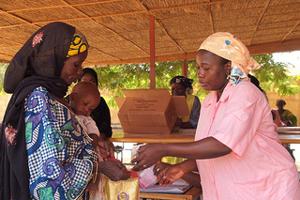
Caritas Niger (CADEV) feeding centre in Augustine, Niamey. Mothers and their children wait to be called to assess the level of malnutrition each and receive the food supplements for one week of treatment.
Credits: Worms/Caritas
“Don’t cry Adrjiera,” said Momeye to her baby girl. “Don’t suckle so hard. My breast milk is finished as I too must eat.” The 20-year-old mother arrived a day ago in this feeding centre in Saga, a suburb of Niger’s capital Niamey.
Her daughter suffers from severe acute malnutrition, a life threatening condition requiring urgent treatment. Without therapeutic feeding, between a third and a half of cases for under-fives end in death. If the children get the help they need, their chances of survival go up dramatically.
Children and mothers receive the necessary care at the centre, run by the Sisters of Charity with the support of CADEV, the national Caritas organisation in Niger. They regain their strength and are integrated in a regular programme to monitor their health.
At the moment, eight mothers with children in acute danger are hospitalised in the centre. Thirty more less severe cases wait in the courtyard to receive food supplements for their children and food for themselves so they can resume breastfeeding. They receive enough for a week.
“Today, there are fewer people coming to the centre,” said Sr Marie Dalmascin. “As the rainy season has arrived, many women stay in their villages to help with farm work. But those who come with children in a critical condition, save their children. We always manage to save them.”
Niger has one of the highest infant mortality rates in the world. More than 140,000 children die each year from causes related to poverty and malnutrition.
“We haven’t eaten more than once a day for months,” said Domo Hamani, a 50 year old grandmother. She has just returned to her village of Louga after making the trip to the Saga feeding centre with her one year old granddaughter, Hajara.
“Hajara has terrible stomach aches because of the lack of food. The poverty is so bad,” said Domo Hamani. “Her mother was unable to go to the centre because she is six months pregnant. It took a whole day to get there. It was the first time I had been. The sisters welcomed us and gave Hajara food supplements to recover her strength. I’m so happy. Next week we will return for a check-up and for new rations.”
Drought and pest attacks meant the last harvest in Niger was bad, leaving serious food shortages in many villages. Domo Hamani says that in her village food reserves have been empty for four months. She says the situation is very difficult. People survive by picking leaves from bushes, but they’re hard for children to digest.
Domo Hamani welcomed the Caritas team into her home. “I have nothing to cook today,” she said, apologising for does not being able to offer her guests something to eat as is traditional in Niger. “Fortunately, my granddaughter will eat. That is the most important thing.”
Children under 5 years and their mothers are the first victims of food crisis affecting the West African countries of the Sahel region, including Niger. Ensuring they receive food is a priority for Caritas.
More than 8000 families (over 56000 people) with one malnourished child or more will receive food supplements. Mothers will have get grain rations. Keeping them healthy means they can breastfeed and keep their babies alive too. The mothers will also take courses on basic hygiene to stop the kinds of infections come with malnutrition.
Hawa Allassane and Hadiza Soumana are two mothers who live in the village of Koira Bano, about 160 km north of Niamey. This is one of the places that is most affected by the food crisis. Farmers have seen production of crops fall by 90 percent.
“I wake up every morning with the fear that my children will go to bed that evening without having had something to eat,” said Hawa Allassane. “It’s a terrible feeling of helplessness for a mother. The pain gnaws at you nonstop.”
As well as providing food to mothers and children, Caritas is supporting a seed fair in the village. Farmers receive drought resistant seeds so that they will be able to feed themselves in future.
“The children do not show their teeth when their stomachs are empty,” said Hadiza Soumana. “Thanks to Caritas, my girls are beautiful because they have something to eat. They smile again and my mother’s heart has found a little joy.”
